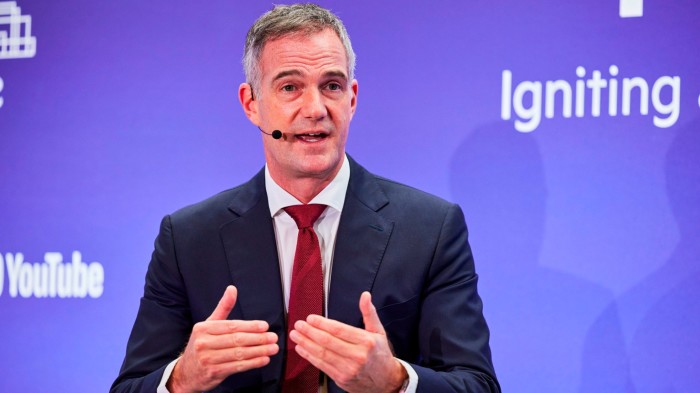Unlock the Editor’s Digest for free
Roula Khalaf, Editor of the FT, selects her favourite stories in this weekly newsletter.
An artificial intelligence tool to mark schoolchildren’s homework is being developed using a trove of UK government data, ahead of plans to sell public records including health information within a decade.
A new government scheme has pooled public documents such as curriculum guidance, lesson plans and anonymised pupil assessments, which are now being used to train AI models, including one that can mark children’s work and provide detailed feedback.
The “content store” — created by UK company Faculty AI with £4mn of government investment — serves as an early prototype for ministers as they draw up broader plans to sell anonymised public data to researchers and businesses within 10 years, science, Innovation and technology secretary Peter Kyle told the Financial Times.
The program is “a really good example of the kind of gathering of data together and the use of data that . . . will ultimately be the National Data Library”, he said.
Sir Keir Starmer’s Labour party set out plans in its manifesto to create a National Data Library which would aggregate and store troves of government data that could eventually be monetised.
So far, companies, data experts and government officials have been unclear exactly what form this “library” will take, and whether it would simply be used to improve government record-keeping or if plans were afoot to sell the data to third parties.
But Kyle said public data that could include anonymised health records “will be used for public benefit and part of that will be the commercialisation of it for scientific endeavour”.
“Some of it will lead to commercialisation and commercial activity, I’m not squeamish about that,” he told the FT. “I will just be driven by making sure that it has public benefit.”
In January, the prime minister announced an “AI Opportunities Action Plan”, which was written by Starmer’s AI adviser Matt Clifford and recommended making five high-impact public data sets immediately available to the private sector and proactively collating data that would be useful to innovators.
At the time, Starmer refused to answer questions about whether national data would be sold and how it would be priced.
A report by the Tony Blair Institute think-tank about the National Data Library last month noted that “there is still no clear, bold vision for its purpose or how it should be delivered”.
Kyle suggested it would not be possible to set up the library within this parliament — which is expected to run till 2029 — but said he was “very confident” it could be done by the end of the “decade of national renewal” that Starmer pitched when he was elected.
The government is currently midway through a six-month scoping exercise for the National Data Library, Kyle said.
“The interaction between the private sector will happen only when we are able to reassure the public it will happen in a safe way and the benefits of doing so will be made absolutely clear to the public,” Kyle said.
The science secretary said that the data would remain in Britain and be used in the UK, though he was open to it being used by overseas researchers and companies.
“What we will not have is companies from abroad coming in and using our data and taking it abroad,” he said.
Tom Nixon, managing director of applied AI at Faculty who was involved in developing the content store, said that “at the moment, we’re giving access for free, but you can imagine over time you would have paid-for access to the data”.
